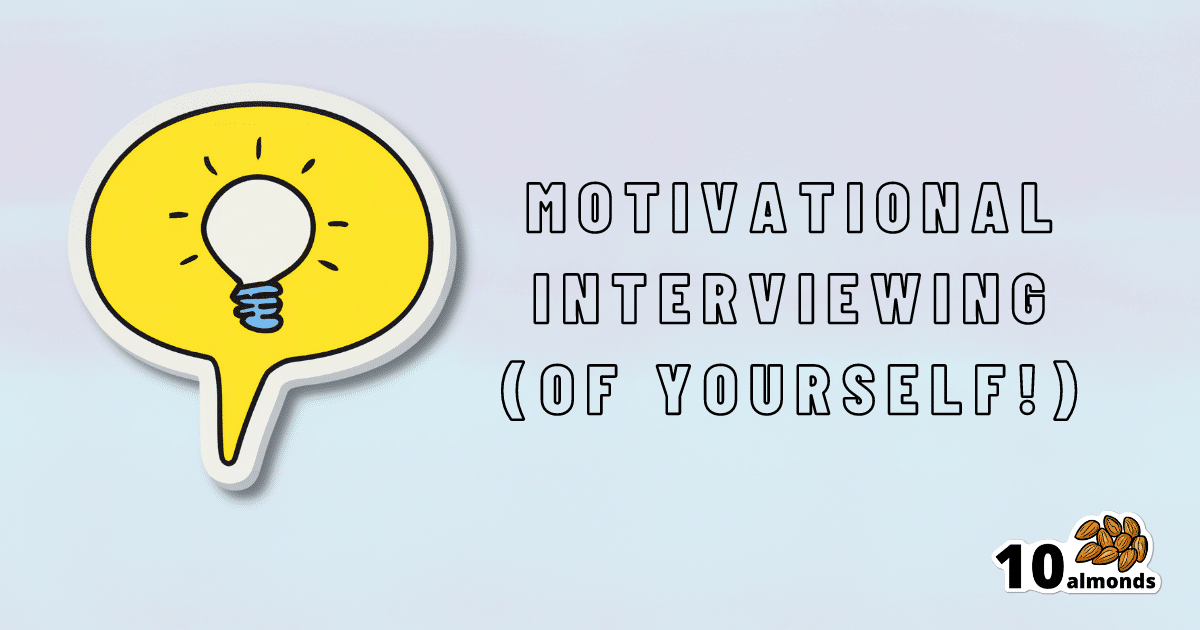When You Know What You “Should” Do (But Knowing Isn’t The Problem)
When knowing what to do isn’t the issue. Learn about Motivational Interviewing, a technique to help make positive changes in your life. Find out more here.

When knowing what to do isn’t the problem
Often, we know what we need to do. Sometimes, knowing isn’t the problem!
The topic today is going to be a technique used by therapeutic service providers to help people to enact positive changes in their lives.
While this is a necessarily dialectic practice (i.e., it involves a back-and-forth dialogue), it’s still perfectly possible to do it alone, and that’s what we’ll be focussing on in this main feature.
What is Motivational Interviewing?
❝Motivational interviewing (MI) is a technique that has been specifically developed to help motivate ambivalent patients to change their behavior.❞
Read in full: Motivational Interviewing: An Evidence-Based Approach for Use in Medical Practice
It’s mostly used for such things as helping people reduce or eliminate substance abuse, or manage their weight, or exercise more, things like that.
However, it can be employed for any endeavour that requires motivation and sustained willpower to carry it through.
Three Phases
Motivational Interviewing traditionally has three phases:
- Exploring and understanding the issue at hand
- Guiding and deciding importance and goals
- Choosing and setting an action plan
In self-practice, maybe you can already know and understand what it is that you want/need to change.
If not, consider asking yourself such questions as:
- What does a good day look like? What does a bad day look like?
- If things are not good now, when were they good? What changed?
- If everything were perfect now, what would that look like? How would you know?
Once you have a clear idea of where you want to be, the next thing to know is: how much do you want it? And how confident are you in attaining it?
This is a critical process:
- Give your answers numerically on a scale from 0 to 10
- Whatever your score, ask yourself why it’s not lower. For example, if you scored your motivation 4 and your confidence 2, what factors made your motivation not a lower number? What factors made your confidence not a lower number?
- In the unlikely event that you gave yourself a 0, ask whether you can really afford to scrap the goal. If you can’t, find something, anything, to bring it to at least a 1.
- After you’ve done that, then you can ask yourself the more obvious question of why your numbers aren’t higher. This will help you identify barriers to overcome.
Now you’re ready to choose what to focus on and how to do it. Don’t bite off more than you can chew; it’s fine to start low and work up. You should revisit this regularly, just like you would if you had a counsellor helping you.
Some things to ask yourself at this stage of the motivational self-interviewing:
- What’s a good SMART goal to get you started?
- What could stop you from achieving your goal?
- How could you overcome that challenge?
- What is your backup plan, if you have to scale back your goal for some reason?
A conceptual example: if your goal is to stick to a whole foods Mediterranean diet, but you are attending a wedding next week, then now is the time to decide in advance 1) what personal lines-in-the-sand you will or will not draw 2) what secondary, backup plan you will make to not go too far off track.
The same example in practice: wedding menus often offer meat/fish/vegetarian options, so you might choose the fish or vegetarian, and as for sugar and alcohol, you might limit yourself to “a small slice of wedding cake only; coffee/cheese option instead of dessert”, and “alcohol only for toasts”.
Giving yourself the permission well in advance for small (clearly defined and boundaried!) diversions from the plan, will stop you from falling into the trap of “well, since today’s a cheat-day now…”
Secret fourth stage
The secret here is to keep going back and reassessing at regular intervals. Set your own calendar; you might want to start out weekly and then move to monthly when you’re more strongly on-track.
For this reason, it’s good to keep a journal with your notes from your self-interview sessions, the scores you gave yourself, the goals and plans you set, etc.
When conducting your regular review, be sure to examine what worked for you, and what didn’t (and why). That way, you can practice trial-and-improvement as you go.
Want to learn more?
We only have so much room here, but there are lots of resources out there.
Here’s a high-quality page that:
- explains motivational interviewing in more depth than we have room for here
- offers a lot of free downloadable resource packs and the like
Check it out: Motivational Interviewing Theory & Resources
Enjoy!
Share This Post
Learn To Grow
Sign up for weekly gardening tips, product reviews and discounts.




